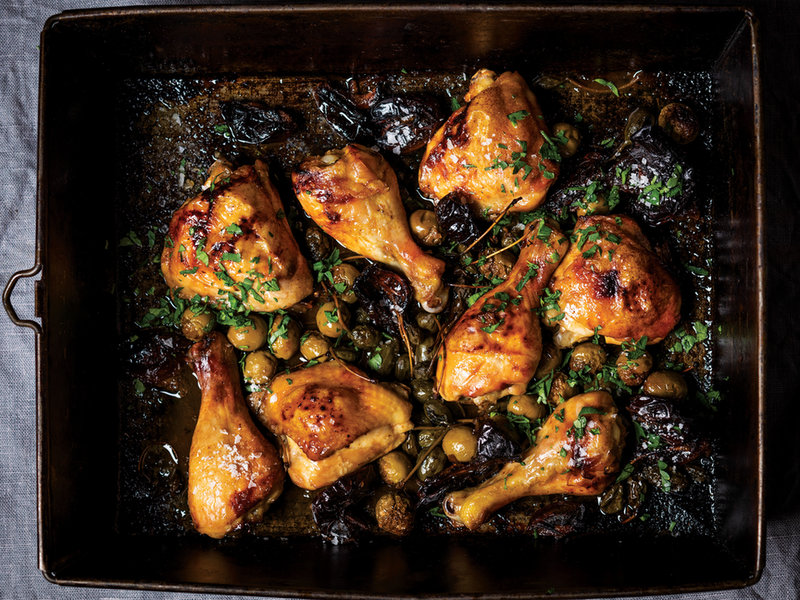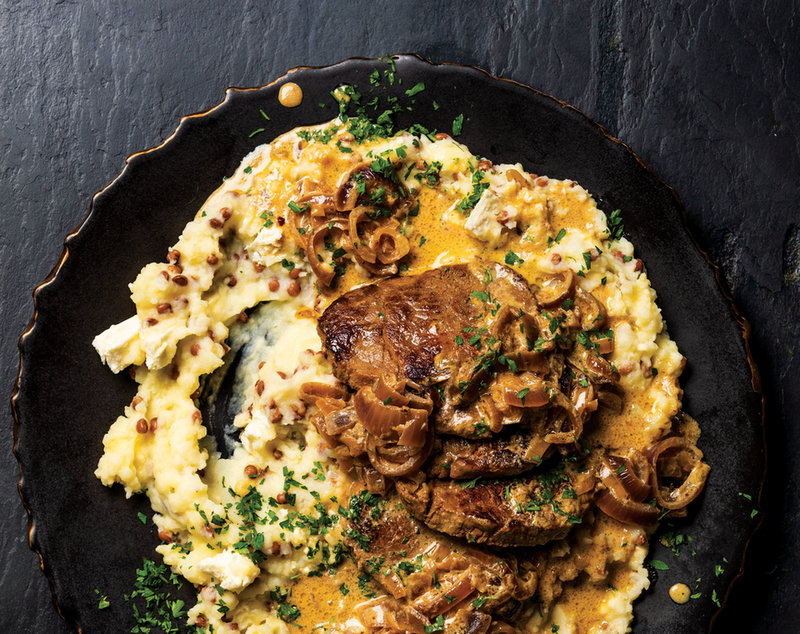
Every family has them: recipes which are handed down through the generations or passed on to friends. They’re that good! Trish van der Nest has smartly combined her much-loved recipes in a book and is sharing it with a wider audience.
FIRM
favourites

The pandemic might have had locked down folks baking banana bread or sourdough loaves, but for mother-of-four Trish van der Nest it kick-started her first book – Home Food. It was all about carb-conscious recipes – and was swiftly followed by her second book, Cooking with Love: Treasured recipes from friends and family.
Van der Nest, a lawyer, lecturer, divorce mediator, homeopath and bioethicist is first and foremost passionate about food. “All the important things in life for me have happened around food and the table,” she said in an interview. “I cook for so many reasons but mostly, cooking is my love language and it is always my way of showing my love for the people I am cooking for.”
For her, nothing beats a gathering of friends or family around a table, tucking into food she has prepared. Cooking with Love: Treasured recipes from family and friends is a refreshingly personal collection of more than 50 recipes, some old family favourites, others gleaned from friends or even adapted from inspiration provided by others in books or magazines.
Throughout the beautifully illustrated pages there are personal anecdotes which allow the reader a glimpse into the reason it made it into the book or the context for the recipe. Like the fact that the steak with lentil and feta mash was always the first thing her kids wanted after returning home from boarding school!
By sharing her memories and thoughts, as well as her favourite recipes, Trish van der Nest is ensuring that whoever looks to this book will find inspiration as well as a personal warmth, as comforting as a familiar hug!



Roasted tomato and yoghurt salad
My friend, Leigh Eastwood, is a marvel at making up recipes. Her version of a Greek salad entails roasting the tomatoes, olives and feta, and serving it at room temperature. It’s very delicious! This version is not unlike Leigh’s hot Greek salad, but with a slight twist.
Serves 4
400 g rosa tomatoes
2–4 whole garlic cloves, peeled
1–2 tsp chilli flakes
2 Tbsp dried origanum
¼ cup (60 ml) olive oil
500 g double cream yoghurt or labneh (see Notes)
Finely grated zest of 2 limes
Salt flakes or coarse sea salt
Fresh origanum or basil, for garnish
Place the tomatoes, garlic, chilli flakes and dried origanum in a roasting dish. Add a splash of olive oil and roast in a preheated oven at 180°C for 20–30 minutes. Set aside to cool slightly.
Spread the yoghurt or labneh over the base of a shallow serving dish.
Scatter over the lime zest and the salt.
Spoon over the warm tomatoes, together with any liquid from the roasting dish.
Garnish with fresh herbs and serve immediately.
Notes
To add colour, use multi-coloured rosa tomatoes, or half each of red and yellow cherry tomatoes.
Instead of yoghurt, use 500 g bought or homemade labneh.


Chicken with olives, dates and caper berries
My friend, Jilly Lester, calls this dish “wedding chicken” because it is perfect for feeding a crowd. It is one of those recipes that never fails to please, yet each time you eat it, it tastes slightly different. The inspiration comes from Yottam Ottolenghi’s cookbook Simple.
8–12 chicken pieces, bone-in and skin-on
200 g pitted green olives, drained
200 g whole pitted dates or pitted prunes
200 g jar caper berries in vinegar
1 cup (250 ml) white wine
Fresh parsley and/or origanum, for serving
Serves 4–6
Place the chicken in a roasting dish with the olives, dates or prunes and caper berries. Pour over the wine and the liquid from the caper berries and set aside to marinate for 2–3 hours.
Roast in a preheated oven at 180°C for 60–90 minutes, turning the chicken two or three times, until the skin is browned and the meat is tender. Garnish with chopped parsley or origanum before serving.
Notes
I like to use chicken thighs and drumsticks, but choose whatever portions work best for you.
Use caper berries, not capers. Caper berries have a subtle, pickle-like sour flavour, which counteracts the sweetness of the dates or prunes.


Pan-fried peppercorn fillet steaks with lentil and feta mash
When my children returned from boarding school for the holidays, they inevitably chose this for their first home-cooked meal; it’s always been a winner in our home. Prepare the mash first, so it is ready and waiting before you start to cook the steaks.
Serves 6
Peppercorn marinade
4 Tbsp whole black peppercorns, lightly crushed
2 Tbsp olive oil
2–3 Tbsp lemon juice
2 tsp salt
Beef fillet
1–1.5 kg beef fillet, cut into 6 steaks (each ± 3–4 cm thick)
Butter, for frying
250 g fresh shallots, thinly sliced
250 ml pouring cream
2 Tbsp dry sherry or marsala (see Note)
Lentil and feta mash
5 large potatoes, peeled and quartered
3–4 Tbsp butter
½ cup (125 ml) milk, warmed
400 g can lentils, drained
125 g feta, crumbled
Salt and black pepper to taste
Peppercorn marinade:
Combine the marinade ingredients in a non-reactive dish. Add the steaks and turn to coat, pressing down lightly so the peppercorns stick to the meat. Set aside to marinate for 30 minutes.
Beef fillet:
When ready to cook, heat some butter in a large pan on medium and fry the shallots until golden.
Remove the steaks from the marinade. Place in the pan and brown on all sides. Cook for a total of 4 minutes per side for medium-rare, turning once.
Turn off the heat and add the cream and sherry or marsala to the pan. Stir through and leave to rest for 1–2 minutes, until the sauce thickens.
Lentil and feta mash:
Boil the potatoes in salted water until tender, then drain and return to the pot.
Add the butter and warm milk and mash the potatoes until smooth.
Stir through the lentils and feta, and season to taste (feta is salty, so taste first before adding salt). Keep warm while you prepare the steaks.
Notes
Marsala, a fortified wine from Sicily, can be either dry or sweet. If you don’t consume alcohol, just omit it.
This recipe has been adapted from 101 Greatest Recipes: Delicious Dishes From Our Food Editors by Abigail Donnelly, Hannah Lewry and Phillipa Cheifitz, published in 2009.


Pasta with marinated tomatoes and brie
Di Utton, who was a member of my book club many years ago, is a wonderful cook. She says her whole family grew up with this simple pasta dish. She lives in Cape Town now, but we still see them when we holiday in Kommetjie.
Serves 4
6 roma (plum) tomatoes
1 wedge brie cheese
2 Tbsp olive oil
2 Tbsp balsamic vinegar
2 cups finely chopped fresh basil
500 g linguine, penne or fusilli pasta
Salt and black pepper to taste
Chop the tomatoes into bite-size pieces and place in a bowl.
Chop or tear the brie into bite-sized pieces and add to the bowl, together with the olive oil, balsamic vinegar and half the basil. Set aside to marinate for at least 4, or up to 8 hours.
When ready to serve, cook the pasta according to the package instructions. Drain, and immediately add to the marinated tomatoes and brie. Toss gently to combine; the heat of the pasta will start to melt the cheese. Scatter over the remaining basil and serve warm.
Notes
Instead of roma tomatoes, use 200g cherry tomatoes, halved.
For a lower-carb option, replace the pasta with 500 g baby marrow noodles.
COMPETITION TERMS AND CONDITIONS
Competition submissions should reach us no later than 25th October 2022. The Prize/s is as indicated, no alternatives or cash will be provided. The decision of Integrated Media will be final, and no correspondence will be entered into. Under no circumstances shall Integrated Media, TOPS at SPAR, SPAR or its appointed representatives and the prize donors be liable to anyone who enters these Prize Draws for an indirect or consequential loss howsoever arising which may be suffered in relation to the Prize Draws. By entering these competitions, you make yourself subject to receiving promotional information. Entrants are deemed to have accepted these terms and conditions. Prize Draw Rules: The prize draw is only open to consumers who must be over 18 years of age and resident in South Africa. Employees of Integrated Media and TOPS at SPAR, SPAR and their respective advertising, media and PR agencies, as well as the family members, consultants, directors, associates and trading partners of such organisations and persons are ineligible for the draw. Participants can only win one competition every three issues.